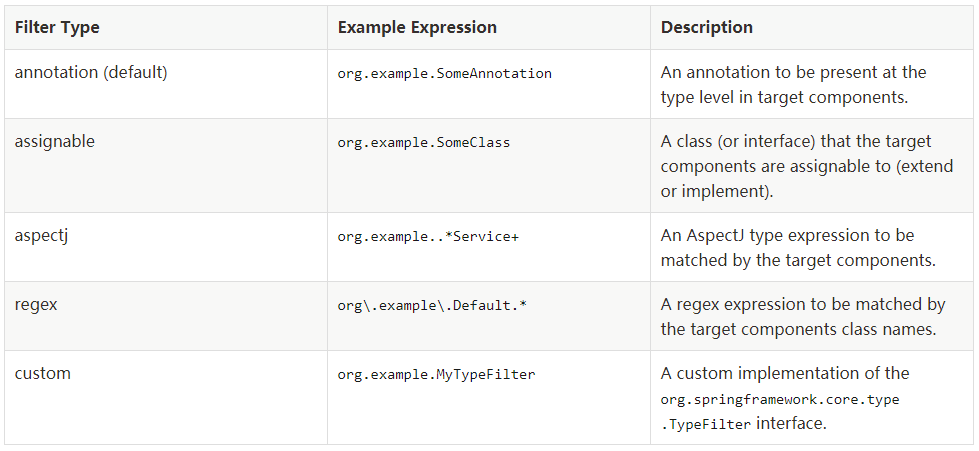@ImportResource
用在springboot的启动类,用于将外部xml文件进行解析和注入bean
1
2
3
4
5
6
7
8
9
10
11
12
| @Retention(RetentionPolicy.RUNTIME)
@Target({ElementType.TYPE})
@Documented
public @interface ImportResource {
@AliasFor("locations")
String[] value() default {};
@AliasFor("value")
String[] locations() default {};
Class<? extends BeanDefinitionReader> reader() default BeanDefinitionReader.class;
}
|
- value和locations互设别名
- BeanDefinitionReader:设置需解析xml文件内部bean对象的解析器,默认为BeanDefinitionReader.class
@Bean
用于标注在方法实例、配置类上,标识改对象为Bean对象可以被spring扫描,但是如果spring未扫描该标注对象所处路径则不会注入到spring容器。(通常结合@Component与@Configuration使用)
1
2
3
4
5
6
7
8
9
10
11
12
13
14
15
16
| @Target({ElementType.METHOD, ElementType.ANNOTATION_TYPE})
@Retention(RetentionPolicy.RUNTIME)
@Documented
public @interface Bean {
@AliasFor("name")
String[] value() default {};
@AliasFor("value")
String[] name() default {};
Autowire autowire() default Autowire.NO;
String initMethod() default "";
String destroyMethod() default "(inferred)";
}
|
- value与name互设别名
- autowire:设置是否自动织入(即注入),默认为否,如果设置是则无需扫描自动实现注入到spring容器
- initMethod:指定初始化方法,默认为空
- destroyMethod:指定销毁方法,默认为(inferred)
@ComponentScan
通常与@configuration一起使用用于标注在配置类、启动类上,设定扫描范围并实现注入。( @Component, @Repository, @Service, @Controller,@Bean,@Configuration等可以实现被ComponentScan默认识别但不扫描不会自动注入因此需要扫描)
1
2
3
4
5
6
7
8
9
10
11
12
13
14
15
16
17
18
19
20
21
22
23
24
25
26
27
28
29
30
31
32
33
34
35
36
37
38
39
40
41
42
43
| @Retention(RetentionPolicy.RUNTIME)
@Target({ElementType.TYPE})
@Documented
@Repeatable(ComponentScans.class)
public @interface ComponentScan {
@AliasFor("basePackages")
String[] value() default {};
@AliasFor("value")
String[] basePackages() default {};
Class<?>[] basePackageClasses() default {};
Class<? extends BeanNameGenerator> nameGenerator() default BeanNameGenerator.class;
Class<? extends ScopeMetadataResolver> scopeResolver() default AnnotationScopeMetadataResolver.class;
ScopedProxyMode scopedProxy() default ScopedProxyMode.DEFAULT;
String resourcePattern() default "**
|
- 该标注被标注为@Repeatable即可以实现重复标注
- value与basePackages互设别名用于设定扫描路径
- basePackageClasses用于指定扫描类路径
- nameGenerator:用于设置Bean名称生成器
- scopeResolver:用于设置元数据解析器
- scopeProxy:用于设置范围代理
- resourcePattern:用于设置资源路径,默认为“*/.class”
- userDefaultFilters:设置是否使用默认扫描路径过滤器
- includeFilters:用于设置包含过滤器对象,类型为ComponentScan.Filter[]数组
- excludeFilters:用于设置排除过滤器对象,类型为ComponentScan.Filter[]数组
- lazyInit:设置是否lazy初始化
- Filter:ComponentScan内部过滤器注解,type:标识过滤器类型,value与classes互设别名,pattern设置路径表达式,案例如下:
1
2
3
4
5
6
| @Configuration@ComponentScan(basePackages = "org.example",
includeFilters = @Filter(type = FilterType.REGEX, pattern = ".*Stub.*Repository"),
excludeFilters = @Filter(Repository.class))
public class AppConfig {
...
}
|
filter类型以及适用范围如下:

@Configuration
通常与@Bean结合使用,用于标注配置类,其具备@Component的特性,必须被扫描才可以实现注入
1
2
3
4
5
6
7
8
9
10
| @Target({ElementType.TYPE})
@Retention(RetentionPolicy.RUNTIME)
@Documented
@Component
public @interface Configuration {
@AliasFor(
annotation = Component.class
)
String value() default "";
}
|
- 简单来看@Configuration为特殊的@Component
- value针对Component设置别名
@PropertySource
通常与@Configuration等结合使用,用于引入外部配置文件实现解析和注入。加载指定的属性文件(*.properties)到 Spring 的 Environment 中.
1
2
3
4
5
6
7
8
9
10
11
12
13
14
15
| @Target({ElementType.TYPE})
@Retention(RetentionPolicy.RUNTIME)
@Documented
@Repeatable(PropertySources.class)
public @interface PropertySource {
String name() default "";
String[] value();
boolean ignoreResourceNotFound() default false;
String encoding() default "";
Class<? extends PropertySourceFactory> factory() default PropertySourceFactory.class;
}
|
- name:属性资源名称,默认为空
- value:String数组,表示外部资源路径
- ignoreResourceNotFound:设置为发现指定路径资源时是否忽略,默认忽略
- edcoding:指定编码方式,默认为空
- PropertySourceFactory:指定属性资源工厂类
1
2
3
4
5
6
7
8
9
10
11
12
13
14
| @Configuration
@PropertySource(value = {"classpath:/com/${my.placeholder:default/path}/app.properties"})
public class AppConfig {
@Autowired
Environment env;
@Bean
public TestBean testBean() {
TestBean testBean = new TestBean();
testBean.setName(env.getProperty("testbean.name"));
return testBean;
}
}
|
或者与@Value配合使用
1
2
3
4
5
6
7
8
9
10
11
12
13
14
15
16
17
18
19
| package com.huang.pims.demo.props;
import org.springframework.beans.factory.annotation.Value;
import org.springframework.context.annotation.PropertySource;
import org.springframework.stereotype.Component;
@Component
@PropertySource(value = {"test/props/test.properties"})
public class ReadByPropertySourceAndValue {
@Value("${test.name}")
private String name;
@Value("${test.sex}")
private int sex;
@Value("${test.type}")
private String type;
}
|
版权声明:本文为博主原创文章,欢迎转载,转载请注明作者、原文超链接,感谢各位看官!!!
本文出自:monkeyGeek
座右铭:生于忧患,死于安乐
欢迎志同道合的朋友一起交流、探讨!
 monkeyGeek
monkeyGeek


 monkeyGeek
monkeyGeek


